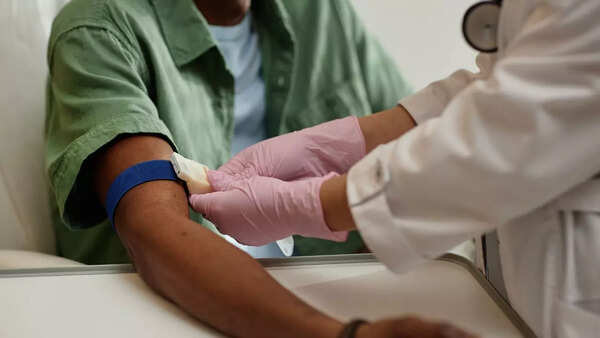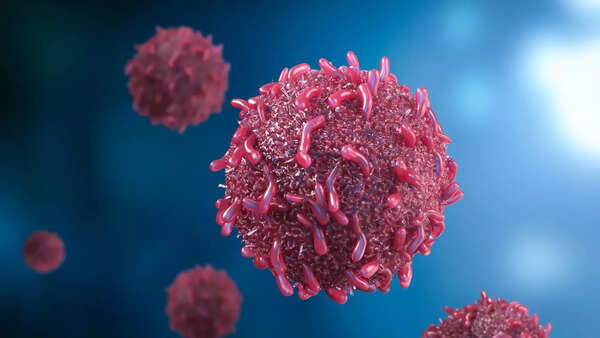Cancer could be detected 3 years before symptoms appear with a simple blood test; new study reveals
A groundbreaking study by researchers at Johns Hopkins University suggests that a simple blood test could detect cancer years before any symptoms manifest. This innovation has the potential to revolutionize early diagnosis and prevention, significantly improving survival rates and treatment options for millions.

Published in the journal Cancer Discovery, the study highlights the potential of early cancer detection through a novel blood test.
Early Detection: A Critical Advantage
The key to successful cancer treatment lies in early detection. Tumors caught in their initial stages are generally smaller, less aggressive, and more responsive to treatment. According to researcher Yuxuan Wang from Johns Hopkins, detecting cancer three years in advance provides crucial time for intervention, increasing the likelihood of a cure. This early advantage could be the difference between a manageable condition and a life-threatening one, particularly for aggressive forms of the disease.
At the core of this research is the identification of circulating tumor DNA (ctDNA). Tumors naturally release fragments of their DNA into the bloodstream. Detecting these minute traces, especially in the early stages, has been a significant challenge.

The Science Behind Blood-Based Cancer Detection
Scientists employ sophisticated algorithms and cross-checks to analyze blood samples, searching for specific modifications in DNA patterns indicative of tumors. This technique forms the basis of a Multi-Cancer Early Detection (MCED) test, designed to identify cancer-specific genetic changes in the blood.
The research team analyzed blood samples from 52 individuals, divided into two groups:
- 26 people who were later diagnosed with cancer within six months of sample collection.
- 26 people who remained cancer-free.
The MCED test flagged eight cancer cases, representing a 31% detection rate. This detection occurred before any formal diagnosis or visible symptoms.

Promising Results and Future Challenges
Further analysis of older blood samples revealed even more compelling evidence. Blood samples from six of the eight individuals detected by the MCED test, taken 3.1 to 3.5 years before their diagnosis, showed cancer signals in four of those samples. Although the ctDNA levels were significantly lower than the current test threshold, the presence of these signals suggests that tumors begin shedding DNA into the blood long before symptoms appear.
These results underscore the potential of early detection while highlighting the need to improve the sensitivity of current technology. Dr. Bert Vogelstein, a senior cancer researcher involved in the project, emphasizes that this study sets the benchmark for the sensitivities required for future tests to succeed.
The Next Steps: From Lab to Clinic
While the science is encouraging, translating these findings into clinical practice requires rigorous clinical trials to prove the reliability and safety of blood-based cancer screening tests. These tests must undergo regulatory approvals before widespread adoption. Furthermore, determining the appropriate clinical follow-up after a positive test result, including further scans, biopsies, or even preventive treatments, is crucial.

Despite these challenges, this research signals a significant step forward in cancer diagnostics, paving the way for improved survival rates and treatment outcomes through early detection and intervention.
Newer articles
Older articles
-
 This new AI tool can help you book train tickets, get refunds and check details on IRCTC website and app
This new AI tool can help you book train tickets, get refunds and check details on IRCTC website and app
-
 5 smart tricks to instantly influence anyone (without being pushy), as per psychology
5 smart tricks to instantly influence anyone (without being pushy), as per psychology
-
 Cancer could be detected 3 years before symptoms appear with a simple blood test; new study reveals
Cancer could be detected 3 years before symptoms appear with a simple blood test; new study reveals
-
 Don't worry about the outside world: Tendulkar's advice to Gill
Don't worry about the outside world: Tendulkar's advice to Gill
-
 ESA reveals the first stunning images of an artificial solar eclipse created by Proba-3 satellites
ESA reveals the first stunning images of an artificial solar eclipse created by Proba-3 satellites
-
 Chess: 'My wife is way more attracted to me now' — Magnus Carlsen after record rating in freestyle
Chess: 'My wife is way more attracted to me now' — Magnus Carlsen after record rating in freestyle
-
 NASA astronauts prepare ‘space sushi’ aboard the ISS in zero gravity during a heartwarming crew celebration
NASA astronauts prepare ‘space sushi’ aboard the ISS in zero gravity during a heartwarming crew celebration
-
 Amitabh Bachchan calls working with son Abhishek Bachchan his 'greatest blessing'
Amitabh Bachchan calls working with son Abhishek Bachchan his 'greatest blessing'
-
 Tait rues new-ball miss as Nissanka punishes Bangladesh
Tait rues new-ball miss as Nissanka punishes Bangladesh
-
 IND vs ENG: Virat Kohli & Rohit Sharma retirements will hurt India in England, feel Matthew Hayden and Graeme Smith
IND vs ENG: Virat Kohli & Rohit Sharma retirements will hurt India in England, feel Matthew Hayden and Graeme Smith